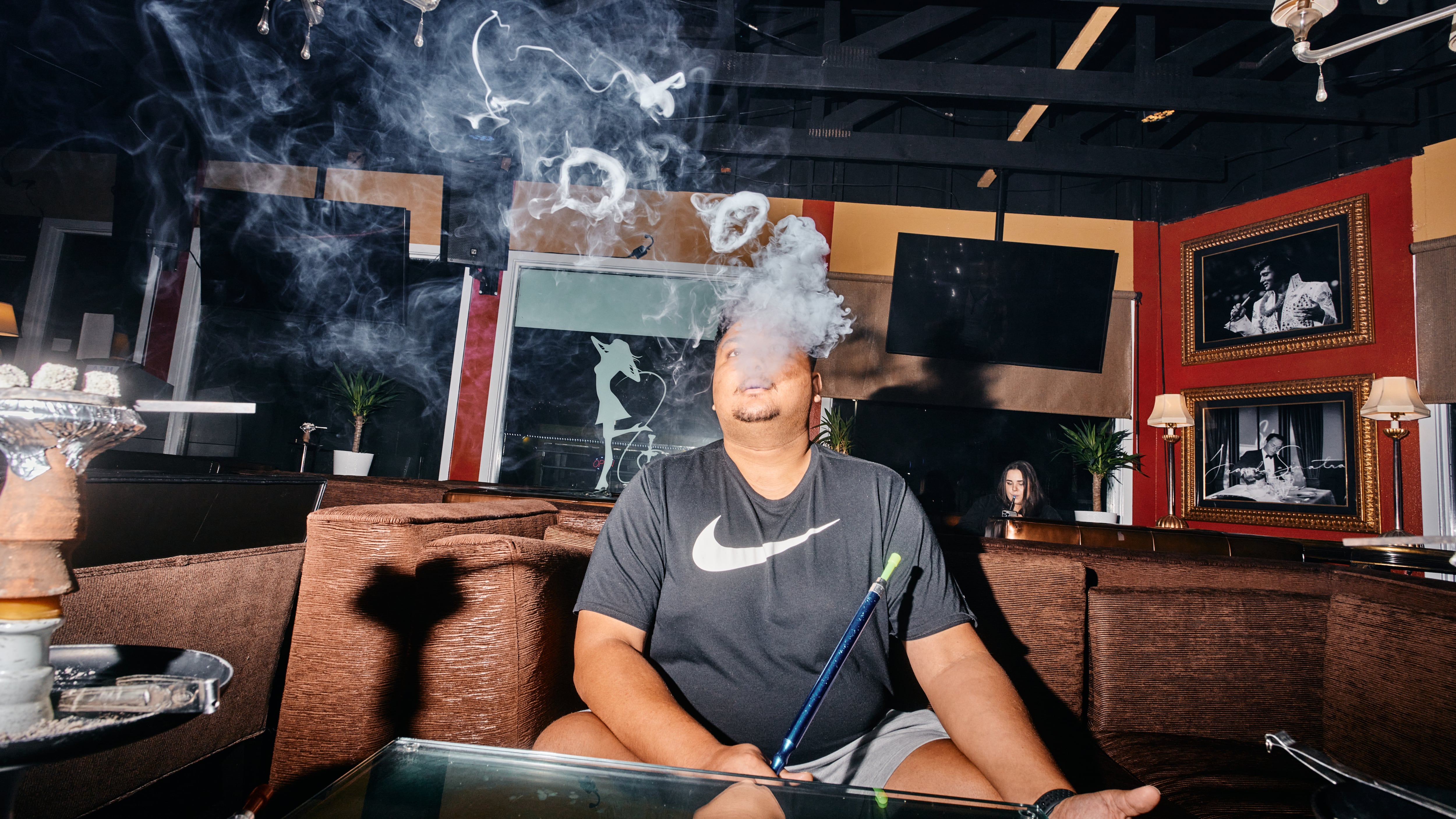This fall, the Multnomah County Board of Commissioners could ban flavored tobacco.
County health officials have a clear goal for the ban: limit youth access to nicotine. After all, hundreds of yummy-sounding vape products are available to entice children from the playground into full-fledged nicotine addiction, including such flavors as gummy bear, tropical slushy, banana ice cream and rainbow Skittles.
But another result of a flavored-tobacco ban would be the closure of all of Portland’s hookah lounges.
Hookahs are water pipes for smoking fruit-flavored tobacco that became popular centuries ago in ancient Persia and India. Today, they are popular in the Middle East and North Africa—and among communities in Portland that hail from those places.
At Mr. Hookah on Southeast Stark Street at 183rd Avenue, customers can choose from about two dozen flavors of sticky, reddish hookah tobacco, also called shisha. Owner Clovis Ain packs the shisha into a hockey puck-sized bowl atop an ornate, 3-foot glass hookah with attached hose. Finally, he uses tongs to place three hot coals made from coconut husks on top of the whole apparatus to heat up the shisha.
“You have to be 21 to be on the premises, and if you buy anything, you have to sit and smoke it here,” Ain says. “I’m not selling stuff to go hide it in your backpack and smoke it in school.”
There are only three hookah lounges in Portland and seven in all of Oregon, down from 10 before the pandemic. They are grandfathered in under the state’s Indoor Clean Air Act to allow indoor smoking, so the hookah industry here cannot expand beyond those 10 licenses.
Ain’s Tigard location of Mr. Hookah falls under Washington County’s flavored-tobacco ban that voters passed in May. That ban is on pause, however, snarled up in court after several businesses—including King’s Hookah Lounge—sued the county.
County commissioners will be briefed on the flavored-tobacco ban Sept. 27, after which the county will draft an ordinance and hold public hearings. (Such a ban would not require a public vote.) So far, commissioners are staying mum whether they’re for or against an exemption for hookah lounges; none of the five were ready to comment.
The hookah lobby’s strategy in response is to seek an exemption for hookah lounges. This has worked in Los Angeles, San Diego and Denver.
Lobbyists for the National Hookah Community Association, which includes shisha manufacturers like Dubai-based Al Fakher, have already met with three of the five county commissioners about a possible exemption.
“Hookah is a cultural practice—particularly for religions that do not drink alcohol—to socialize and come together,” says hookah lobbyist Chris Hudgins. “Frankly, it’s something that is hard for regulators and folks in the U.S. to understand.”

Multnomah County health officer Dr. Jennifer Vines replies that hookah poses a lot of nicotine and tobacco exposure for users—and she opposes an exemption.
According to the U.S. Centers for Disease Control and Prevention, users may inhale in a typical one-hour hookah smoking session 100 to 200 times the amount of smoke they would in a single cigarette. People who smoke hookah may be at risk for some of the same diseases as cigarette smokers, including oral, lung, stomach and esophageal cancers, reduced lung function, and decreased fertility, says the CDC.
Still, hookah is not Vines’ primary target. The first of her two goals for the ban is limiting youth initiation to tobacco and nicotine use. (Hookah is not a tobacco product commonly used by teens, studies show.) Second, Vines is eager to ban menthol cigarettes, which are disproportionately used by communities of color that have been heavily targeted by menthol-specific advertising.
“For all the public health emergencies of the last three years—extreme heat, terrible air quality, and COVID—people with underlying health conditions are at a higher risk,” Vines says. “This is a meaningful way to actually address the underlying conditions themselves.”
At the Tigard location of Mr. Hookah, Ain says his clientele is a “big mix” of African, Arab and American customers. In Gresham, it’s 90% African American and African, including customers from Ethiopia and Somalia. He prides himself on his lounges’ “classy vibe,” with uniformed servers, chandeliers and a three-tiered fountain in the middle of the room.
Ain, 32, is originally from Damascus and came to the U.S. when he was 11. He used to skip school to work at his parents’ Los Angeles restaurant and hookah bar because he loved the business so much.
At his Stark Street lounge, which he opened in 2015, smoking a hookah costs $24 and lasts a user up to two hours. Often, customers smoke hookah in groups and pass the hose around, which costs $10 per person and comes with individual, disposable hose tips for sanitary reasons.
Ain’s custom shisha blend for a newbie is cherry, “mighty freeze” (mint and lemon) and “blue mist” (blueberry). Plain shisha exists but it’s rare; even hundreds of years ago, shisha was flavored with molasses and honey.
The irony of a flavored-tobacco ban in Multnomah County just two years after Oregon voters passed Measure 110, decriminalizing the personal possession of small amounts of hard drugs, is not lost on Ain. Mr. Hookah is next door to the county’s Stark Street Shelter, and he picks up used hypodermic needles in his parking lot “all day long.”
“It amazes me,” he says. “Hookah doesn’t take control over your brain. You’re OK to drive after smoking hookah. But meth? Heroin? All this is OK, but we ban flavored tobacco?”
Ain has no Plan B for his career if the county shuts down Mr. Hookah. He has a wife and three young boys, ages 5, 2 and 1. He thrives on socializing with his customers in Arabic, French and English.
“This is the line of my work: hookah,” he says. “If I am not with people every day doing this, I’m not me.”
